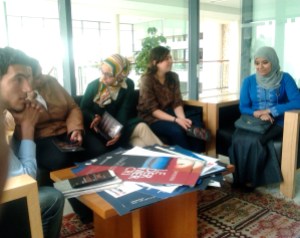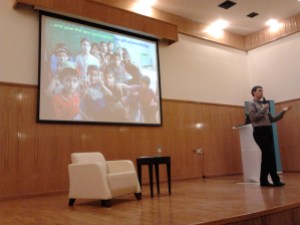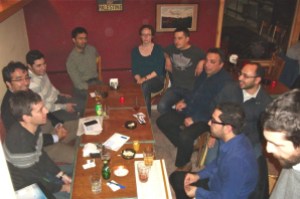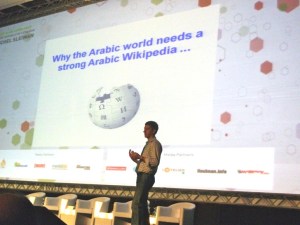The Wikimedia Foundation continues to build momentum around activities focused on the Arabic language region. At the end of March, Barry Newstead visited the region and Moushira Elamrawy (Consultant, Arabic Language Initiative) conducted a number of outreach activities in various Arabic speaking countries. The Arabic Language initiative is a strategic priority for the movement and the Foundation. The visit sought to establish relationships with potential partners and to begin a dialogue on the importance of building Arabic Wikipedia as part of regional efforts to expand Arabic language content on the Internet.
The first stop was at the Dead Sea in Jordan. Moushira was invited by the e-mediat program to conduct a workshop for participants from more than 20 NGOs from Lebanon and Jordan. Several Lebanese and Jordanian NGOs working in the areas of history preservation, video blogging, and human rights showed interest in organizing Wikipedia sessions for their members and incorporating their up-to-date, sourced data from their research into Wikipedia articles. According to a recent study, Jordan’s contribution to online content is mainly in Arabic, and the country is one of the main contributors to the 3 percent of global online content that is in Arabic, an interesting fact which opens doors to fruitful activities.
Next Moushira traveled to Morocco, which, despite its reputation as a francophone country, is the 4th largest content contributor to the Arabic Wikipedia. Her first stop was Tetouan, in northern Morocco, where she hosted a session at The National School of Education, a government-funded higher education institute. It included a talk about Wikipedia by Fayssal, a local of Tetouan and a longtime Wikipedian (formerly a member of the English Wikipedia’s arbitration committee), and Zack, a significant contributor to the Arabic Wikipedia from Meknes, who led a workshop on how to edit Wikipedia. The attendees asked rich and diverse questions, e.g. on neutrality, fundraising, and how the Arabic Wikipedia could be improved. The school administration was excited about hosting more sessions and about considering how Wikipedia could be efficiently incorporated in their curriculum.

In Tangier, we met with members of CMNT, an association developing open-source software technology in Morocco and spreading awareness about it. In Rabat, we met in the National Library. Moushira was accompanied by a group of Moroccan bloggers and members of Arabtechies. The National Library is a potential partner in the liberation of knowledge. They are buying the copyrights to a number of valuable Arabic-language books and releasing them for free, and all machines for staff and public operate Ubuntu Linux. We are interested in developing a partnership with the library to accelerate content liberation of source material that would be valuable for Wikisource and for Wikipedia. Finally, Moushira traveled to Fes for a second e-mediat workshop for NGOs.
Barry arrived in Cairo for a two day visit. He participated in a small meeting with ambassadors in the Cairo Education Pilot and in meetings with legal consultants, as well as with ADEF, the Arabic Digital Expression Foundation, which has been supporting our current education program in Cairo. He also met with a translation group that is interested in releasing their translations under an open license in order to support our translation efforts. After two days in Cairo, Barry and Moushira had an early morning flight to Amman, where they had a few meetings, including a community meeting with the Mozilla Foundation, Creative Commons, and the Jordan Open Source Association.


 The discussion focused on ways to support local activities in Jordan and some of the best universities to collaborate with. Some attendees showed interest in our grants program, which they can operate for ideas like enhancing content related to Jordanian cities and culture. In the evening Barry gave a talk at the Columbia University Middle East Research Institute (CUMERC) in Amman, which was followed by a number of interesting questions, e.g. about conflict resolution on Wikipedia, and how the free projects have been able to sustain their existence so far.
The discussion focused on ways to support local activities in Jordan and some of the best universities to collaborate with. Some attendees showed interest in our grants program, which they can operate for ideas like enhancing content related to Jordanian cities and culture. In the evening Barry gave a talk at the Columbia University Middle East Research Institute (CUMERC) in Amman, which was followed by a number of interesting questions, e.g. about conflict resolution on Wikipedia, and how the free projects have been able to sustain their existence so far.

The day after we had an early flight to Beirut, where we went to a gathering organized by AltCity, a tech and art incubator. It was a nice chance to connect with a longtime Lebanese Wikipedian, Elias, and with Walid, from the open source community Ma’abar, as well as other tech enthusiasts. Barry and Moushira also met with the Qatar Computing Research Institute to discuss their plans to support Arabic Wikipedia.
The next day, Barry gave an inspiring talk on the community day of the Arabnet digital summit.

Barry’s talk triggered a number of tweets and re-tweets (in English and Arabic). Shortly after his talk, Barry had to leave Beirut for the annual Wikimedia chapters conference in Berlin. Moushira remained in Beirut for a meeting with the Arabthought Foundation, which is currently working on a proposal for supporting Arabic digital content and would like to explore venues of collaboration with Wikipedia. She then met with a founding member of فعل أمر f’eil amer, a local association leading several nationwide campaigns that support Arabic language content.
We are excited about our findings so far and the general enthusiasm for Arabic Wikipedia. There is positive momentum in the community and people we met throughout the region want to contribute. Our challenge is to develop programs that encourage quality contribution and work with the community to support quality growth. The Wikimedia Foundation plans to expand our investment in the region over the next year and will be seeking consultants to support our work in the coming months.
Cheers, سلام
Moushira Elamrawy
Egypt-based consultant, Arabic language projects

Can you help us translate this article?
In order for this article to reach as many people as possible we would like your help. Can you translate this article to get the message out?
Start translation
